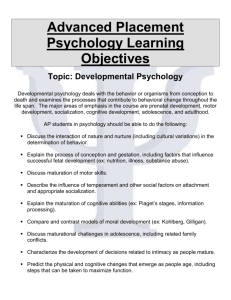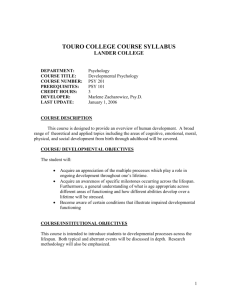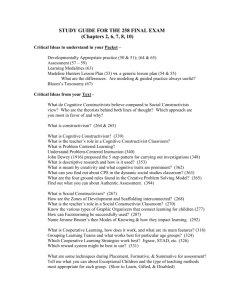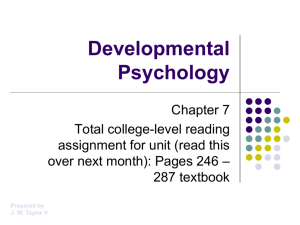Developmental Psychology
advertisement
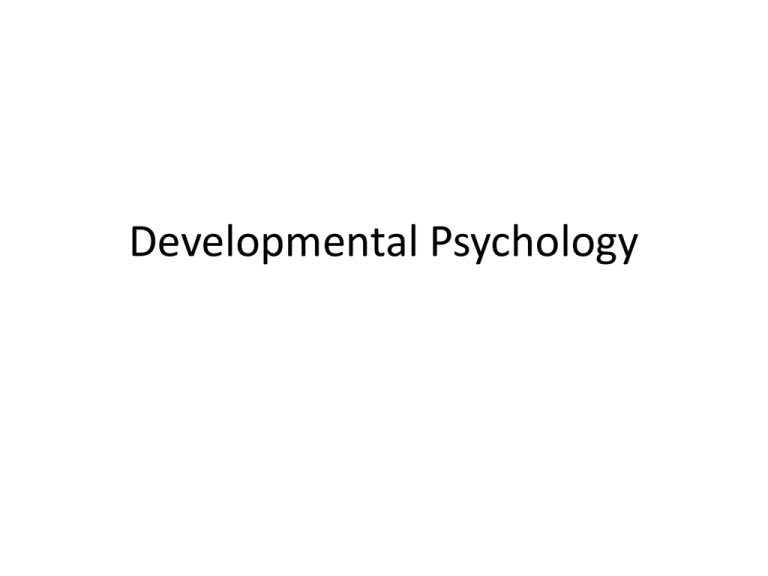
Developmental Psychology Stages of Development • • • • • • • • • Prenatal Infancy Toddler Early Childhood Adolescence Emerging Adulthood Early or Young Adulthood Middle Adulthood Old Age What is Developmental Psychology • Developmental psychology is the scientific study of changes that occur in human beings over the course of their life. • Originally concerned with infants and children, the field has expanded to include adolescence, adult development, aging, and the entire lifespan. • This field examines change across a broad range of topics including motor skills and other psycho-physiological processes; cognitive development involving areas such as problem solving, moral understanding, and conceptual understanding; language acquisition; social, personality, and emotional development; and self-concept and identity formation. Importance • The study of human development is important not only to psychology, but also to biology, anthropology, sociology, education and history. • Developmental psychology helps us to better understand how people change and grow and then apply this knowledge to helping us reach our full potential Research • Developmental psychology examines issues such as the extent of development through gradual accumulation of knowledge versus stage-like development • The extent to which children are born with innate mental structures, versus learning through experience • Many researchers are interested in the interaction between personal characteristics, the individual's behavior, and environmental factors including social context and their impact on development Theories in Developmental Psychology • • • • • • • • Attachment Constructivism Ecological Psychosexual Moral Psychosocial Cognitive Social Learning Attachment Theory • Originally developed by John Bowlby • Focuses on the importance of open, intimate, emotionally meaningful relationships • Attachment is described as a biological system or powerful survival impulse that evolved to ensure the survival of the infant • A child who is threatened or stressed will move toward caregivers who create a sense of physical, emotional and psychological safety for the individual • Attachment feeds on body contact and familiarity Constructivism • Constructivism is a paradigm in psychology that characterizes learning as a process of actively constructing knowledge • Individuals create meaning for themselves or make sense of new information by selecting, organizing, and integrating information with other knowledge, often in the content of social interactions. • Constructivism can occur in two ways: individual and social • Individual constructivism is when a person constructs knowledge through cognitive processes of their own experiences rather than by memorizing facts provided by others • Social constructivism is when individuals construct knowledge through an interaction between the knowledge they bring to a situation and social or cultural exchanges within that content Ecological • Originally formulated by Urie Bronfenbrenner • Specifies 5 types of nested environmental systems with bi-directional influences within and between the systems • The 5 systems are – Microsystem – Mesosystem – Exosystem – Macrosystem – Chronosystem Each system contains roles, norms and rules that can powerfully shape development. Ecological • The Ecology of Human Development has had widespread influence • Family • Economic • Political structures Psychosexual • Freud • Believed that we all had a conscious, preconscious, and unconscious level • In the conscious we are aware of our mental process • The preconscious involves information that, though not currently in our thoughts, can be brought into consciousness • Lastly, the unconscious includes mental processes we are unaware of Psychosexual • He believed there is tension between the conscious and unconscious, because the conscious tries hold back what the unconscious tries to express. • To explain this he developed three personality structures: – Id – Ego – Superego Psychosexual • He proposed five universal stages of development, that each are characterized by the erogenous zone that is the source of the child's psychosexual energy • The first is the oral stage, which occurs from birth to 12 months of age • The second is the anal stage, from one to three years of age • The third is the phallic stage, which occurs from three to five years of age (most of a person’s personality forms by this age) • The fourth is the latency stage, which occurs from age five until puberty • Stage five is the genital stage, which takes place from puberty until adulthood Moral • Piaget claimed that logic and morality develop through constructive stages. Expanding on Piaget's work • Lawrence Kohlberg determined that the process of moral development was principally concerned with justice, and that it continued throughout the individual's lifetime Moral • • • • He suggested three levels of moral reasoning; Preconventional moral reasoning Conventional moral reasoning Postconventional moral reasoning Psychosocial • Erik Erikson reinterpreted Freud’s psychosexual stages by incorporating the social aspects of it • He came up with eight stages, each of which has two crisis (a positive and a negative) Psychosocial • • • • • • • • Trust vs Mistrust Autonomy vs Shame & Doubt Initiative vs Guilt Industry vs Inferiority Identity vs Identity Diffusion Intimacy vs Isolation Generativity vs Self-Absorption Integrity vs Despair Trust vs Mistrust • Infancy - birth to 18 months • Children develop a sense of trust when caregivers provide reliability, care, and affection • A lack of this will lead to mistrust Autonomy vs Shame & Doubt • Early Childhood - 2 to 3 years • Children need to develop a sense of personal control over physical skills and a sense of independence • Success leads to feelings of autonomy, failure results in feelings of shame and doubt Initiative vs Guilt • Preschool - 3 to 5 years • Children need to begin asserting control and power over the environment • Success in this stage leads to a sense of purpose • Children who try to exert too much power experience disapproval, resulting in a sense of guilt Industry vs Inferiority • School Age - 6 to 11 years • Children need to cope with new social and academic demands • Success leads to a sense of competence, while failure results in feelings of inferiority Identity vs Identity Diffusion • Adolescence - 12 to 18 years • Teens need to develop a sense of self and personal identity • Success leads to an ability to stay true to self, while failure leads to role confusion and a weak sense of self Intimacy vs Isolation • Young Adulthood - 19 to 40 years • Young adults need to form intimate, loving relationships with other people • Success leads to strong relationships, while failure results in loneliness and isolation Generativity vs Self-Absorption • Middle Adulthood - 40 to 65 years • Adults need to create or nurture things that will outlast them, often by having children or creating a positive change that benefits other people • Success leads to feelings of usefulness and accomplishment, while failure results in shallow involvement in the world Integrity vs Despair • Maturity - 65 to death • Older adults need to look back on life and feel a sense of fulfillment • Success at this stage leads to feelings of wisdom, while failure results in regret, bitterness, and despair Cognitive Development • Jean Piaget, a Swiss theorist, posited that children learn by actively constructing knowledge through hands-on experience • He suggested that the adult's role in helping the child learn was to provide appropriate materials that the child can interact with and use to construct • He used Socratic questioning to get children to reflect on what they were doing, and he tried to get them to see contradictions in their explanations Cognitive Development • Piaget believed that intellectual development takes place through a series of stages, which he described in his theory on cognitive development • Each stage consists of steps the child must master before moving to the next step. • He believed that these stages are not separate from one another, but rather that each stage builds on the previous one in a continuous learning process. Cognitive Development • • • • • • He proposed four stages: Sensorimotor Pre-operational Concrete operational Formal operational Though he did not believe these stages occurred at any given age, many studies have determined when these cognitive abilities should take place Social Learning • Learning is a cognitive process that takes place in a social context and can occur purely through observation or direct instruction • In addition to the observation of behavior, learning also occurs through the observation of rewards and punishments, a process known as of vicarious reinforcement Social Learning • Learning is not purely behavioral; rather, it is a cognitive process that takes place in a social context. • Learning can occur by observing a behavior and by observing the consequences of the behavior (vicarious reinforcement). Social Learning • Learning involves observation, extraction of information from those observations, and making decisions about the performance of the behavior (observational learning or modeling). Thus, learning can occur without an observable change in behavior. • Reinforcement plays a role in learning but is not entirely responsible for learning. • The learner is not a passive recipient of information. Cognition, environment, and behavior all mutually influence each other (reciprocal determinism). Real Life • http://www.thisamericanlife.org/radioarchives/episode/487/harper-high-school-partone • Using your notes from Chapter 5 & from the lecture discuss the following: – What are the variables that might be a factor in the youth from Harper High School? – Using Erikson’s 8 Stages identify which stage the youth are in. – Discuss the implications of their environment.


